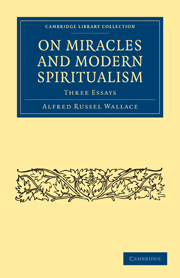I - AN ANSWER TO THE ARGUMENTS OF HUME, LECKY, AND OTHERS AGAINST MIRACLES
Published online by Cambridge University Press: 29 August 2010
Summary
It is now generally admitted, that those opinions and beliefs in which men have been educated generation after generation, and which have thus come to form part of their mental nature, are especially liable to be erroneous, because they keep alive and perpetuate the ideas and prejudices of a bygone and less enlightened age. It is therefore in the interest of truth that every doctrine or belief, however well established or sacred they may appear to be, should at certain intervals be challenged to arm themselves with such facts and reasonings as they possess, to meet their opponents in the open field of controversy, and do battle for their right to live. Nor can any exemption be claimed in favour of those beliefs which are the product of modern civilisation, and which have, for several generations, been held unquestioned by the great mass of the educated community; for the prejudice in their favour will be proportionately great, and, as was the case with the doctrines of Aristotle and the dogmas of the schoolmen, they may live on by mere weight of authority and force of habit, long after they have been shown to be opposed alike to fact and to reason. There have been times when popular beliefs were defended by the terrors of the law, and when the sceptic could only attack them at the peril of his life.
- Type
- Chapter
- Information
- On Miracles and Modern SpiritualismThree Essays, pp. 1 - 28Publisher: Cambridge University PressPrint publication year: 2009First published in: 1875



